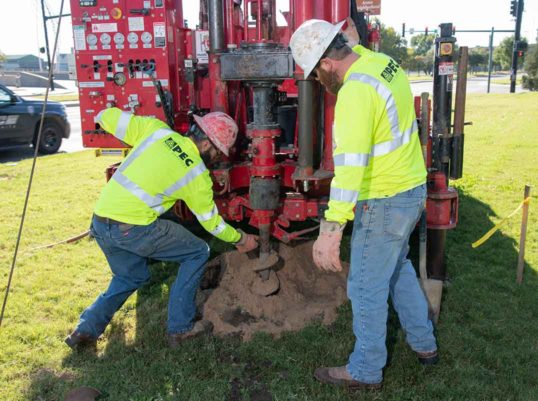Checking out the Advantages of Geotheta for Advanced Geotechnical Investigations
Checking out the Advantages of Geotheta for Advanced Geotechnical Investigations
Blog Article
Navigating Geotechnical Providers: The Relevance of Geotechnical Information, Soil Compaction Screening, and Sidewalk Layout in Ensuring Structural Honesty
Geotechnical solutions, including the manufacturing of geotechnical reports, conducting soil compaction testing, and careful pavement style, offer as the foundation of ensuring structural honesty. geotheta. These crucial components not only lay the foundation for successful task execution but likewise mitigate possible threats that can compromise the stability and toughness of a building and construction project.
Significance of Geotechnical Reports
Geotechnical reports play a critical duty in providing comprehensive understandings right into the dirt and rock problems of a site, necessary for making certain the structural integrity of construction jobs. These records are a basic element of the initial website examination procedure, offering important info that influences the style, building approaches, and general expediency of a job. By evaluating soil composition, stability, and potential risks such as sinkholes or landslides, geotechnical records make it possible for designers to make enlightened choices regarding foundation style and building and construction strategies.
In addition, geotechnical records help in risk assessment and mitigation techniques, aiding task stakeholders understand the prospective challenges that might arise throughout construction. Via thorough exam and analysis of geotechnical data, designers can establish solutions to resolve site-specific problems, ensuring the lasting stability and safety of the framework. Ultimately, the thorough nature of geotechnical reports offers as an essential foundation for effective task planning and implementation, lessening risks and boosting total job end results.

Function of Dirt Compaction Screening
How important is the analysis of dirt compaction via screening for ensuring the stability and longevity of building jobs? Soil compaction screening plays a crucial duty in the building and construction sector by ensuring that the soil beneath a structure is properly compacted to support the intended load and prevent negotiation (geotheta). Effectively compressed dirt gives a secure structure for structures, roadways, and other structures, reducing the risk of structural failing and pricey fixings in the future
Soil compaction screening entails determining the density of the soil and contrasting it to the optimum density achievable for that particular dirt kind. If the dirt has actually been compacted sufficiently to sustain the organized structure, this aids designers identify. By conducting dirt compaction tests during building and construction, designers can identify any locations that need additional compaction and take rehabilitative procedures prior to waging further building and construction.
Relevance of Pavement Layout
Examining dirt compaction via screening not just makes certain the security and long life of building and construction projects but also lays an essential structure for efficient sidewalk style. Appropriate pavement design considers factors such as traffic lots, ecological problems, soil characteristics, and product residential or commercial properties to create a robust and lasting surface area. By including data from soil compaction examinations, designers can establish the proper thickness, materials, and layering for the sidewalk to stand up to expected stresses and keep architectural integrity over time.
Making Certain Architectural Integrity
These reports supply crucial information on soil composition, stability, and prospective dangers, assisting in educated decision-making throughout the design and building stages. In addition, performing comprehensive soil compaction screening is critical to ensure that the soil underneath sidewalks or structures is effectively compressed to support the designated lots and prevent settlement problems.
In addition, implementing robust pavement design practices is important for making sure the architectural stability of roadways, vehicle parking whole lots, and various other smooth surface areas. Correct pavement design considers elements such as traffic quantity, ecological conditions, and dirt characteristics to create secure and long lasting transport framework. By adhering to these techniques and utilizing geotechnical solutions successfully, building projects can boost their architectural stability, minimize threats of failure, and ensure the lasting performance of the built setting.
Securing Against Threats
In light of the critical value positioned on making sure structural honesty with meticulous attention to product choice and soil testing, geotheta.com safeguarding against risks ends up being extremely important in keeping the security and longevity of construction projects. Risks in building jobs can stem from different resources, consisting of all-natural catastrophes, dirt instability, or style problems.
Additionally, creating backup strategies and carrying out durable tracking systems can assist alleviate unanticipated dangers that may occur during construction. Regular evaluations and high quality control steps ought to be executed to guarantee that materials are made use of according to requirements which building and construction techniques stick to market requirements. By proactively determining and resolving possible threats, building jobs can improve their durability and reduce the possibility of structural failures, inevitably making sure the security and longevity of the built setting.
Final Thought

Soil compaction testing plays a vital role in the construction industry by guaranteeing that the soil below a structure is correctly compacted to support the designated tons and avoid settlement.Soil compaction testing involves measuring the thickness of the dirt and contrasting it to the maximum density achievable for that particular dirt kind (geotheta). By performing dirt compaction tests during building, engineers can identify any locations that call for added compaction and take rehabilitative actions prior to proceeding with additional construction
Additionally, conducting thorough dirt compaction screening is important to guarantee that the soil beneath sidewalks or structures is appropriately compacted to support the intended lots and stop negotiation issues.
In conclusion, geotechnical records, dirt compaction screening, and pavement design play crucial roles in making certain the architectural stability of construction projects.
Report this page